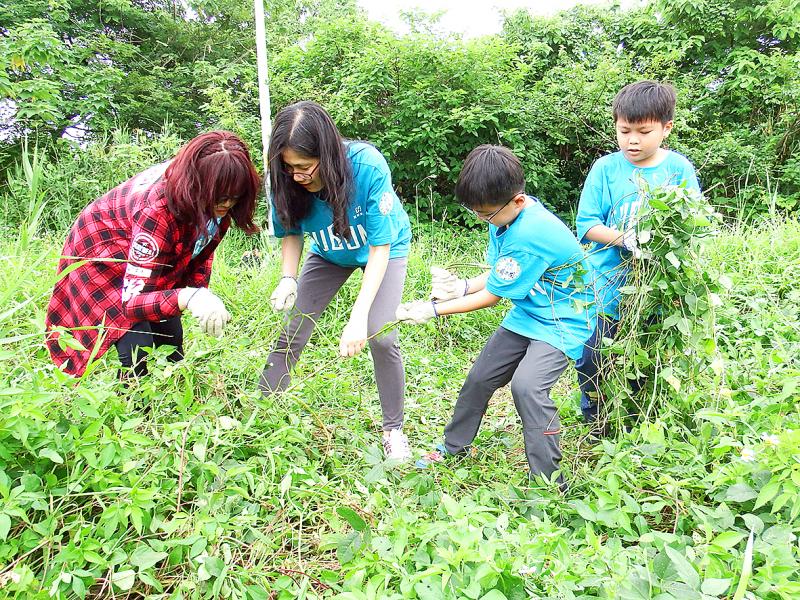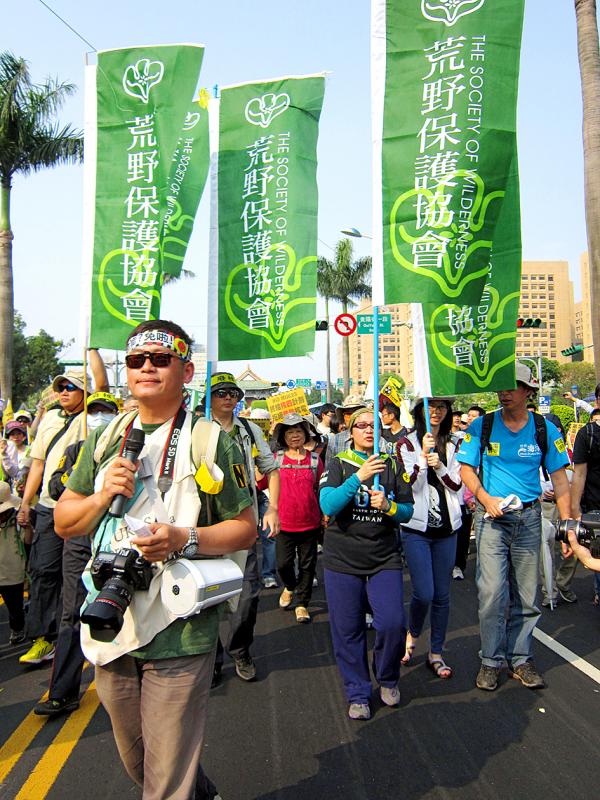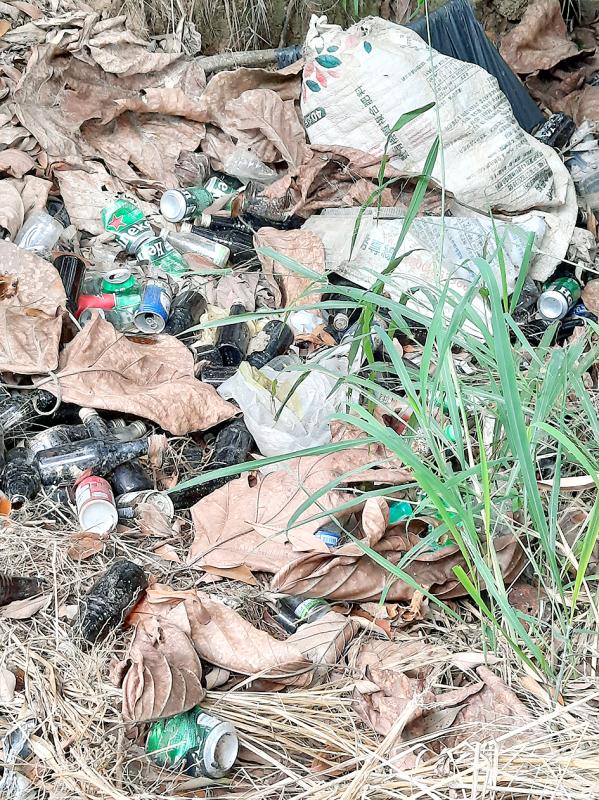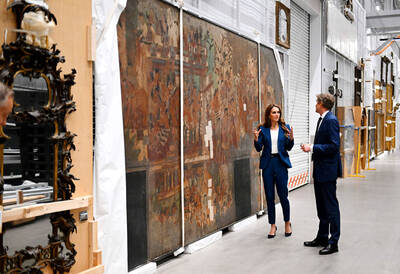Motorists discard cigarette butts and beverage containers along roadsides. Millions of people consume fossil fuels and single-use plastics, without stopping to think about the long-term impact on the planet. As recently as 2020, at least 126 companies were discharging pollutants into northern Taiwan’s Tamsui River (淡水河) — and surely most of them knew what they were doing.
Stricter enforcement of existing laws could reduce littering and polluting, but carrots and sticks aren’t the only tools available to policymakers. Taiwan’s government hopes that, by educating its citizens, the country can move closer to some of its environmental goals.
ENVIRONMENTAL EDUCATION

Photo courtesy of Friendly SEED
The highest level of officialdom recognized the importance of environmental education (EE) more than three decades ago.
In Taiwan’s Struggle: Voices of the Taiwanese, David Chang-yi Chang (張長義) writes that Eugene Chien (簡又新), during his 1987-1991 tenure as the first minister of the Environmental Protection Administration (EPA), “pushed very hard for environmental education [believing that in] the long run, it is necessary to change peoples’ attitudes toward the environment and the best time to start is when people are young.”
However, the Environmental Education Act (環境教育法) didn’t go into effect until June 2011.

Photo courtesy Society of Wilderness
The act requires government units, state-owned enterprises, schools and NGOs that receive 50 percent of their funding from the government to arrange annual environmental education programs for all employees and students, and that classes or activities last at least four hours. These programs reach about one in six Taiwanese.
A March 2013 Global Views Monthly report on the act’s ramifications quoted Chou Ju (周儒), then a professor at National Taiwan Normal University’s (NTNU) Graduate Institute of Environmental Education, as hoping it’d help schools move beyond a common but mistaken belief that garbage separation and recycling count as environmental education.
On top of mandatory programs — and lessons in school textbooks that explain climate change and how to reduce food waste — several NGOs prioritize environmental education.

Photo courtesy of Friendly SEED
Society Of Wilderness (SOW, 荒野保護協會, www.sow.org.tw) is one of them. In addition to protecting habitats and natural ecosystems, the organization aims to “promote awareness of nature conservation, and provide opportunities and environments needed for nature education to the general public,” its Web site says.
Before the pandemic, the society’s 11 branches in Taiwan held regular indoor lectures, on-site activities and training courses for volunteers.
“We’ve designed a lot of content for children and parents. That, in addition to our environmental initiatives, has helped a greater number of people understand our ideas and objectives,” says SOW Secretary-General Lua Jane-lung (劉建隆).

Photo courtesy Society of Wilderness
In 2018 and 2019, total attendance at SOW events was 419,875. Because COVID-19 reduced the scale of in-person events, the combined tally for 2020 and last year was 261,348.
So they can continue their work in spite of restrictions on gatherings, SOW has been putting out podcasts, online videos and livestreams. The “Good Morning Wilderness” (早安荒野) podcast, launched last year, has covered topics such as land crabs, the waterbirds that flock to 52-jia Important Wetland (五十二甲溼地) in Yilan County and the Four-Spot Midget (四斑細蟌).
A rare damselfly, the Four-Spot Midget is found in just a handful of brackish estuaries in East Asia, including a few around Taipei. Alongside research, education and publicity are central to SOW’s efforts to protect both the species and the ecologically-sensitive places it inhabits.

Photo: Courtesy Society of Wilderness
To meet their obligations under the Environmental Education Act, or their own corporate social responsibility (CSR) and sustainability goals, some institutions and companies work with organizations like Friendly SEED (環境友善種子, www.friendlyseed.com.tw), a social enterprise that specializes in providing environmental education services.
Friendly SEED’s clients include Carrefour, E.Sun Commercial Bank (玉山銀行), Guandu Nature Park (關渡自然公園), Hitachi, HSBC and the Taiwan Black Bear Conservation Association (台灣黑熊保育協會).
Since 2014, Kimberly-Clark and Tetra Pak have sponsored 185 Friendly SEED events in local elementary schools. These classes stress the importance of woodland conservation and the role of the Forest Stewardship Council, an international NGO that promotes responsible management of the world’s forests.

Photo: Steven Crook
Friendly SEED also customizes programs for corporate clients’ employees and their families. Because office workers aren’t so willing to attend conventional classes, the social enterprise has learned to “implant environmental concepts in outdoor activities, and offer a less structured curriculum,” says Chiu Yun-hsuan (邱韻璇), the organization’s southern office director.
Common activities include beach and mountain cleanups, tree-planting and the removal of invasive species.
ENVIRONMENTAL ETHICS
Joking that teaching in the traditional manner is “probably the most useless way,” Chiu explains that: “Behavior starts with awareness, so — as much as possible — we hope to create first-hand environmental experiences.”
Rather than focus on a practical issue like habitat conservation, Friendly SEED endeavors to cultivate environmental ethics.
“We’re more concerned about the relationship between humans and the environment, and our courses and activities cultivate participants’ sensitivity and concern,” she says.
The definition of environmental education that appears on the Taiwan EPA Web site is similar: It should help citizens “develop the concept of environmental ethics and the consensus of public participation in environmental protection.”
“It’s difficult to change attitudes and actions in a single lesson or activity. But when we hold a one-off event, we hope at least to arouse awareness of the environment and get people to pay attention to environmental issues, so they’ll carry this concern into their daily lives,” Chiu says.
To bring about effective change, Chiu says, it’s necessary to create opportunities for long-term cooperation between NGOs, schools, companies and government departments. Through such cooperation, she says, “participants can understand their relationship with the environment and deepen their willingness to participate.”
Unfortunately, COVID-19 has prompted many of the companies that Friendly SEED works with to suspend or postpone planned events. There’s a strong preference for real-life activities over online education, Chiu says.
Proponents of environmental education say it can benefit participants as well as help the planet. Youngsters who join these events, they say, are less likely to develop biophobia or suffer from nature-deficit disorder. Getting them outside and active may reduce the incidence of obesity and depression.
A 2018 survey of environmental literacy among undergraduate students, led by scholars at National Taiwan Normal University and Shih Hsin University, found a strong preference for outdoor experiential learning and visits to museums and conservation centers over lectures or online learning. The survey also discovered that most students derived their environmental knowledge from television programs (including news reports) and information seen online, instead of NGOs, textbooks or lectures.
A paper analyzing the survey results, published in Sustainability in May 2018, noted that female students appeared to outperform males in all categories of environmental literacy. Saying that this was consistent with previous studies, the paper’s authors speculated that it could be a consequence of gender roles, because women in Taiwan have “traditionally been taught to love and maintain cleanliness” and take care of their homes.
Survey findings also revealed “no significant correlations between knowledge and attitudes or between knowledge and behavior. However, a higher level of environmental knowledge correlated significantly with a higher degree of pro-environmental behavior [and] stronger attitudes.”
In other words, a little environmental education might be a waste of time, but drumming in key messages could have an effect on people’s actions.
Arguing that simply imparting scientific knowledge often fails to elicit the “values and behavior which constitute a substantial part of environmental literacy,” the paper’s authors recommended that attitudes “be enhanced through interaction with the environment,” so students “develop a sense of responsibility, and increase a personal and collective sense of competence for promoting responsible environmentally-friendly behavior.”
To build environmental awareness, it’s imperative to get people out of their offices and classrooms. And there’s no need to travel to a national park: A guided visit to the nearest polluted waterway or garbage incinerator may be just as effective.
Steven Crook, the author or co-author of four books about Taiwan, has been following environmental issues since he arrived in the country in 1991. He drives a hybrid and carries his own chopsticks. The views expressed here are his own.

June 9 to June 15 A photo of two men riding trendy high-wheel Penny-Farthing bicycles past a Qing Dynasty gate aptly captures the essence of Taipei in 1897 — a newly colonized city on the cusp of great change. The Japanese began making significant modifications to the cityscape in 1899, tearing down Qing-era structures, widening boulevards and installing Western-style infrastructure and buildings. The photographer, Minosuke Imamura, only spent a year in Taiwan as a cartographer for the governor-general’s office, but he left behind a treasure trove of 130 images showing life at the onset of Japanese rule, spanning July 1897 to

One of the most important gripes that Taiwanese have about the Democratic Progressive Party (DPP) is that it has failed to deliver concretely on higher wages, housing prices and other bread-and-butter issues. The parallel complaint is that the DPP cares only about glamor issues, such as removing markers of Chinese Nationalist Party (KMT) colonialism by renaming them, or what the KMT codes as “de-Sinification.” Once again, as a critical election looms, the DPP is presenting evidence for that charge. The KMT was quick to jump on the recent proposal of the Ministry of the Interior (MOI) to rename roads that symbolize

On the evening of June 1, Control Yuan Secretary-General Lee Chun-yi (李俊俋) apologized and resigned in disgrace. His crime was instructing his driver to use a Control Yuan vehicle to transport his dog to a pet grooming salon. The Control Yuan is the government branch that investigates, audits and impeaches government officials for, among other things, misuse of government funds, so his misuse of a government vehicle was highly inappropriate. If this story were told to anyone living in the golden era of swaggering gangsters, flashy nouveau riche businessmen, and corrupt “black gold” politics of the 1980s and 1990s, they would have laughed.

Imagine being able to visit a museum and examine up close thousand-year-old pottery, revel alone in jewelry from centuries past, or peer inside a Versace bag. Now London’s V&A has launched a revolutionary new exhibition space, where visitors can choose from some 250,000 objects, order something they want to spend time looking at and have it delivered to a room for a private viewing. Most museums have thousands of precious and historic items hidden away in their stores, which the public never gets to see or enjoy. But the V&A Storehouse, which opened on May 31 in a converted warehouse, has come up